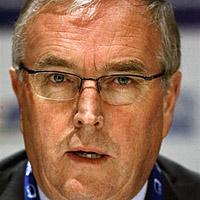News feature, January 27, 2008
UCI seeks solution to federations row
The 2008 season opened under the ray of hope that the sport's doping problems are being solved, but simmering underneath the optimism of the teams and riders is a stew pot of political manoeuvring by cycling's higher-ups which threatens to plunge the sport into a civil war. Cyclingnews' Shane Stokes reports.
 |
When cycling's men in suits met last autumn to come up with a common accord to fight doping, those talks overshadowed negotiations on the equally important conflict between race organisers and the UCI. By uniting to tackle the first of these problems, many anticipated that the common ground discovered there could form the basis for broader talks. However, a resolution appears no closer than before.
After years of conflict between the UCI and Grand Tour organisers ASO, RCS Sport and Unipublic over mandatory invites of all ProTour teams and other issues, cycling's governing body took the unprecedented step of removing the eleven races run by these three groups from the ProTour calendar altogether. What followed wasn't resolution but a further escalation in the tensions between the two sides.
Indeed, six European cycling federations chose to join the organisers in bucking the UCI after the races were 'downgraded' to the European calendar. Austria, Belgium, Spain, Italy, France and Luxemburg wrote to the UCI in a letter dated November 28 suggesting they could hold those 11 races outside the aegis of the UCI.
Earlier this week, the UCI replied with a threat to those national federations' over their rebellious plans, urging them to reconsider or face suspension and exclusion from the world championships.
"It wouldn't be good for the sport at all."- McQuaid on the prospect of a split between the UCI and six national cycling federations. |
The threats being bandied around now raise the prospect of a potentially-disastrous civil war within the sport: one foreshadowed by the Paris-Nice conflict of 2007.
Cyclingnews contacted Pat McQuaid on Thursday to get his viewpoint on the developments. Speaking from Treviso, the location of this weekend's world cyclo-cross championships, the Irishman argued that the prospect of a split within cycling would be "horrendous" for the sport.
He said that he intends discussing the matter with some of the presidents of those federations over the weekend. McQuaid was clear about the dangers of the situation should it continue to escalate. "It wouldn't be good for the sport at all," he stated. "Ultimately [if it happened], it wouldn't be good for their events [the Grand Tour organisers], no more than it would be good for the UCI or anybody else.
"If you start looking at the ongoing implications of something like that, it is horrendous."
The possibility of federations being excluded from the world championships - and, theoretically, the Olympic Games - is something which no-one would welcome. That said, it is naïve to think that these six countries would not face sanction should they decide to directly oppose the sport's governing body and break the regulations which are in place. The climate is, for all concerned, highly unsatisfactory.
McQuaid said that he is open to discussions on the issue. "I am prepared for dialogue, I am ready for dialogue. I am hoping and indeed expecting to meet some of these presidents here this weekend and I will discuss the issue with those presidents of the particular federations when I meet them. I have no problem in doing that [having discussions]. I will point out to them the difficult position that they are putting the UCI in, as well."
How the crisis evolved
McQuaid pleased with Tour Down UnderWith the races organised by ASO, RCS Sport and Unipublic no longer part of the series, the new-look ProTour got underway this week with the Tour Down Under. McQuaid is encouraged by how things have gone with the Australian race. "I am very happy," he told Cyclingnews. "I have had daily communication from people down there, and also the Australian member of the management committee [Ray Godkin] who arrived here [Treviso, Italy] today. " They have all said that this is an absolutely outstanding success in Australia. It has lifted cycling there up several notches, in terms of the whole presentation of the race, in terms of the public perception of the race, in terms of the institutional support for the race. It is just incredible. "From that point of view we are very happy. It is a very good thing for cycling that a ProTour race has taken place with big success outside of Europe, and it augurs well for the future." Biological passports not accepted by Grand Tours yetThe Tour Down Under is also the first event to implement the UCI's new anti-doping programme. Both the measures in place there and those planned for the Tour of California are far more comprehensive than seen before in the sport and, with the exception of some delays on agreeing funding, he is happy with the progress. "Things are going to plan very much with the passport. Things have been ramped up in terms of the numbers of out of competition testing, etcetera. "However once again there is a negative element in that we still haven't agreed things with the [Grand Tour] organisers as regards their contribution. There is a meeting scheduled with them in the middle of February which hopefully will sort that out. "I have to say that the teams have been extremely positive. It is one of the first times that the teams have been completely in unison in terms of the support for something like this, and also the financial support. "They are contributing heavily to the whole biological passport. Riders, the UCI are all contributing but, as I said, we still have to finalise it with the organisers. "I am hopeful that it will be done in the next two weeks. Otherwise there would be a threat to the development of the biological passport within the timeframe that is being asked. If we don't get the full budget required to do it, it will take us longer to produce it." |
 |
Relations between the UCI and the Grand Tour organisers have been poor for several years, with the ProTour being the biggest source of conflict. ASO, RCS Sport and Unipublic never fully embraced the restructuring of the sport, saying continuously that they objected to a number of aspects including the lack of a promotion/relegation system and the requirement to grant entry to all of the ProTour teams.
The UCI countered by saying that the ProTour would help develop the sport and guarantee growth in areas as diverse as sponsorship, spectators and media coverage. The strain hit its peak in 2007 when the Grand Tour organisers defied the rules requiring them to invite all ProTour teams, and excluded the Unibet team from each of the Grand Tours. While a temporary peace agreement was hammered out, and the season completed, the situation only grew worse.
During the Tour de France, the embarrassing exit of yellow jersey Michael Rasmussen over whereabouts violations placed further strain, and the ASO publicly blamed McQuaid and the UCI for failing to prevent the situation, saying they should have excluded the Dane from the Tour. Indeed the race organiser went as far as to accuse the UCI of deliberately sabotaging the race.
With relations worsening, it came as little surprise when the organisers broke off all contact and said that they would form no future part of the ProTour. The UCI finally agreed to this, deciding to redevelop the series and to incorporate events such as the Tour Down Under into it instead.
Separation by no means ended the battles.
"This current scenario started in November, when I got a letter from the six federations saying that they had signed a convention amongst each other to assist the organisers of the three Grand Tours to organise races outside the UCI," said McQuaid. "I wrote to them and pointed out that they cannot do that, and that they would be breaking the rules of the UCI in doing so. I asked for a copy of this convention, but they never responded to that letter.
"With a UCI management committee meeting taking place today [Thursday] and tomorrow, I wrote to them two weeks ago asking them specifically if it was their intention to break the rules of the UCI. I wanted to know if they intended staying within the UCI. I gave them a deadline of last Monday to respond to that. Five of them replied, the Spanish federation did not. The responses were not very satisfactory, to say the least. So tomorrow we will be discussing the implications of this response, and the implications of the situation that the UCI finds itself in."
McQuaid stated that it is premature to speak about sanctions such as barring countries from the world championships. "It is too soon to talk about that, because while we have the threat that federations might possibly go outside the UCI, we cannot naturally enough act until such time as they break the regulations. But if they do decide to break those regulations, the UCI will have no option but to consider sanctions."
No agreement on ProTour withdrawal
When asked about the nature of this latest impasse, he accepts that dissatisfaction with the new ranking of the races run by the Grand Tour organisers is a big part of the problem. When those races left the ProTour, all bar the Tour de France were made part of the Europe Tour. The organisers were not happy with this because they viewed the new status as a downgrade. And, while the new ranking allowed the inclusion of more wild-card teams, there were still rules in place for the Tour which required ProTour teams to be invited.
"Whatever we do doesn't seem to make them happy."- McQuaid on trying to come up with a solution to the conflict with the Grand Tours |
"Whatever we do doesn't seem to make them happy," said McQuaid. "They didn't want to be in the ProTour, even though they and the UCI came up with the original proposal [together]. They decided at the last minute that they weren't coming into it.
"Eventually in September last year the management committee decided to accede to their demands and cut them out of the ProTour. In doing so, we had to decide where to put them. The only place where we can put them is in the Europe Tour, because it is the only calendar in Europe.
"They talk about wanting to be on a global calendar, but there no longer is a world calendar. There is only the World Championships, the Olympic Games, and then the Europe Tour, the American Tour, etcetera. The calendars have been changed since the reform of cycling in 2005. So, with the exception of the Tour de France, which we put in a privileged position beside the World Championships and the Olympic Games, we put the others at the top of the Europe Tour.
"These other events went in at the very top of the new category and we even changed the regulations to assist them, in that we did away with the 50 percent rule for their events. This related to the numbers of ProTour teams and Pro Continental teams which previously had to be in the races. Changing that means that they can invite who they want to their events, so they can organise their events in the same way as they have always done in the past. But now they are not happy with that. It is hard to understand what they really want."
Government intervention
 |
Considering the failure of both sides to find a satisfactory solution last season, the prospects appear bleak for now. One possible avenue which could lead to progress comes from a recent meeting with the French Secretary of State for Sports, Bernard Laporte.
"I had a meeting with him two weeks ago at his request," said McQuaid. "He was concerned about the situation and he indicated to me that President Sarkozi is also concerned about the conflict between the UCI and ASO, and the effect it might have on the Tour de France. The Tour is regarded as part of the history of France, and he was concerned that this year's race should go well and not have the problems of the last two years.
"Anyway, he met with me to find out what the UCI's position on it was as regards the Tour de France, which I explained to him. We also explained that ASO has put the UCI in a very difficult situation because of the continuing conflict. He offered to see if there would be a way to try and perhaps mediate between the two groups. We told him that we are certainly prepared to do that. We discussed some possibilities and he said he would go back to ASO with those. I haven't heard anything from him since."
If the mediation takes place, McQuaid feels that this area might help constructive dialogue to take place. "It certainly sounded like he would offer whatever assistance he could to try and resolve the situation. So I'm still hoping that he might be able to do something there."
The Grand Tour organisers and their supporters claim that the UCI is becoming too involved in matters relating to the running of races, and that not enough consideration is being given to the monuments of the sport and those who organise them. The opposing view is that ASO, RCS Sport and Unipublic simply want to protect their turf and will oppose anything that they feel encroaches on that.
McQuaid believes the latter, and said that there is a clear lack of objectivity as a result. "You are looking at people who have a commercial, vested interest in organising events and they are also making the rules and regulations for those events," he said. "It just doesn't make sense [for that to happen]. I think in a very short period of time the teams and the riders would realise that the objectivity has gone out of the window. The one thing that the UCI guarantees is objectivity, in terms of its rules and regulations and what is good for the sport.
"Any decisions which we make in terms of rules and regulations are because we feel they are good for the sport, from a sporting perspective. However, any decisions that will be made by a commercial organiser are purely made on commercial grounds."
And that, he argues, is the source of the conflict. It's also a problem that needs to be overcome quickly and cleanly, otherwise the sport risks a disastrous split. It's time for both sides to sit down and talk things out.

